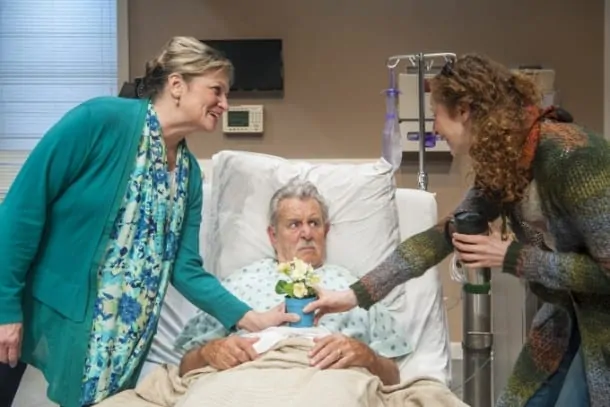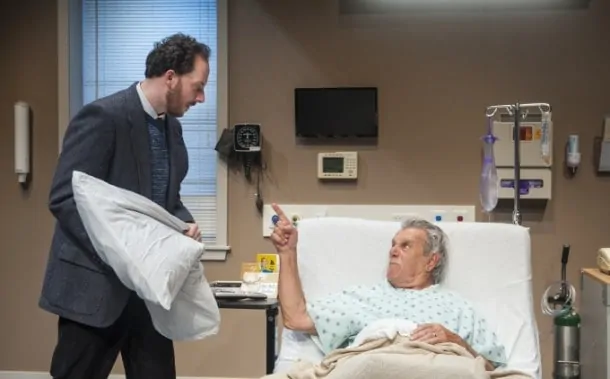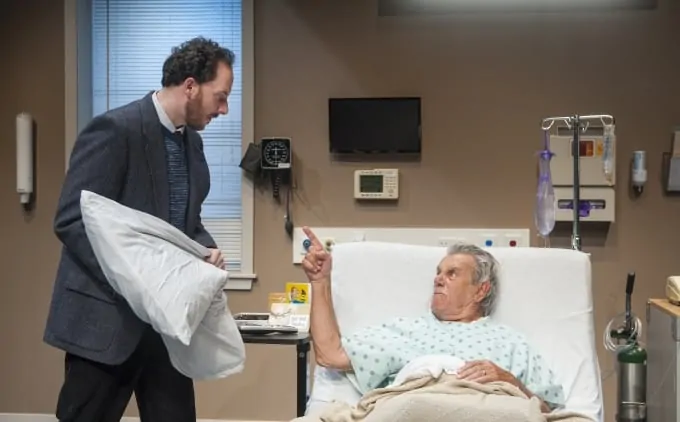
The first minutes in any theatre are all about making that transition. You look around, checking out the set. A sad or incomplete set – an honest labor, but lacking vision or inadequately provisioned – sets one expectation. Then there’re sets so lush and rich, they’re distractions unto themselves, groaning with bookshelves to explore. Director Damashek’s rep for minimalism, along with set designer Eric Sinkkonen’s history of killer sets at the Aurora, makes decoding the hospital room onstage an enjoyable exercise.
Providing the basics is easy enough: bed, IV poles, bed table, antique landline, sharps box, all the accoutrements. However, the professionalism lay in the entire back wall. Indirect lighting from a shaded window and smoked glass door: check. White outlet panel over the bed: check. Monitors: check. Cup dispenser: check. Horrible fluorescent lighting: check. Chart holder: check. Without these pieces, the rest would be an exercise in playing house – or hospital. Frankly, they had me at the outlet panel.
What was missing was all the other hospital room crap. Gone is hospital room clutter. None of the reminders of civilian life with which we try to delude ourselves that we’re not in the belly of the institutional beast. Gone too, the incessant beeping that kidnaps consciousness. Everything is calculated to render you quietly curious, and more than a little vulnerable to the abrasiveness of the beginning dialogue. There’s nothing extraneous here, hijacking your attention.
Opening you up that way is critical because the opening dialogue has to feel incredibly abrasive, for playwright Nicky Silvers’ script to work its magic. It doesn’t take 10 seconds to realize these people are a mess. In what artistic director Tom Ross calls “the template of the dysfunctional family-gathered-around-the-dying parent play,” the work opens with wife Rita (Ellen Ratner) at the bedside of husband Ben (Will Marchetti). Ratner’s nasal Long Island accent is not so offensive that you write her off completely, but she does intentionally play that one dangerously close. Above all, you wonder Who are these two to each other? Is this really the time to be arguing about redoing the living room? You never question why your attention is fixed like a laser on these really disagreeable people.

Don’t think for a moment that Silvers will linger on ideas (and there are many possibilities) about that living room design and the stains on the couch. This play moves quickly and both acts just fly by. The energy quickly shifts when daughter Lisa (Jessica Bates) enters the room. Way-too-thin and way-too-brittle, she’s so much of piece that even her AA sponsor won’t return her calls. Add gay son Curtis, complete with imaginary boyfriends and toothbrush mustache, to the mix of this very damaged lot.
The catch with this of course, is that this is a Nikki Silvers’ play – which means this addled crew, who bear just enough resemblance to your own family, will have you laughing non-stop throughout the entire production. I’m not talking about small polite giggles, but explosive belly laughs. These people hook some part of you so that you can’t let them go – even when they’re desperately pushing each other out of the room. And that of course is why this works so well. The need to connect balances the need to escape – and it’s that impulse that gives rise to the humor. Sure: strike out and date a stage four lymphoma patient. Just remember, when you come back, your mother’s seeing your former AA sponsor. One can’t help but laugh.
The good news is that audience reception has been so strong that The Lyons just got extended through March 8. As spring breaks out across the city, you’ll be wanting to spend some time at the Aurora.



